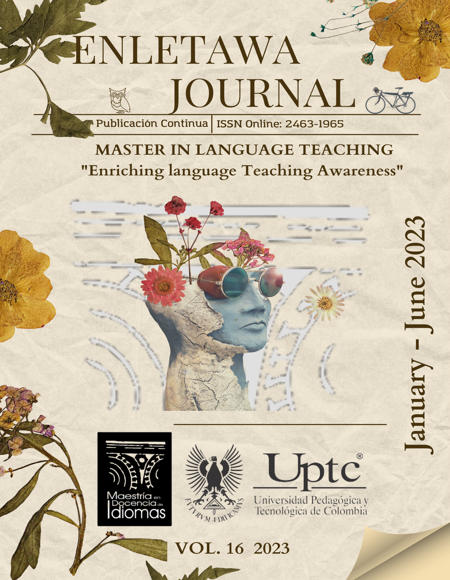Students’ perspectives regarding the institutional English courses in Universidad Surcolombiana

Abstract
This narrative research study allows us to learn about the usefulness of the mandatory institutional English courses at the Universidad Surcolombiana, Neiva branch, for students of other undergraduate programs in English and their academic, professional, and personal impact. It uses the open interview anonymously to collect their experiences and to promote free expression by using questions related to the courses and based on their environment and previous contact with English using Spanish to better understand. Likewise, the English for Specific Purposes model was taken into account and presented as an idea to the students as a strategy to implement it in the different programs. The results indicated that the benefits obtained in these courses were very limited for English learning and improving the level of students, evidencing the need for English according to their program for the adequate professional development of each one.
Keywords
Institutional English courses, English learning, benefits, English for Specific Purposes, students
Author Biography
Karla Tatiana Yara Falla
Active student from Bachelor Universidad Surcolombiana
Ximena Collazos
Bachelor Degree in Language Teaching Universidad Surcolombiana
References
- Archyde. (2020). Colombia is the third country in Latin America with the worst level of English. Archyde website. https://www.archyde.com/colombia-is-the-third-country-in-latin-america-with-the-worst-level-of-english/
- Arias Castilla, C. A., & Angarita Trujillo, A. E. (2014). Aproximación a los antecedentes del bilingüismo en Colombia y la formación de educadores bilingües. Horizontes Pedagógicos, 12(1). https://horizontespedagogicos.ibero.edu.co/article/view/130
- Barkhuizen, G., Benson, P., & Chik, A. (2013) Narrative Inquiry in Language Teaching and Learning Research. New York. Routledge. DOI: https://doi.org/10.4324/9780203124994
- Creswell, J. W. (2009). Research Design. Qualitative, Quantitative, and Mixed Methods Approaches. SAGE publishing.
- Congreso de la República de Colombia. (1994). Ley 115 de Febrero 8 de 1994 por la cual se expide la ley general de educación. http://www.mineducacion.gov.co/1621/articles-85906_archivo_pdf.pdf
- Consejo Superior Universitario. (2009). Acuerdo 065 de 2009. Neiva. Universidad Surcolombiana. https://www.usco.edu.co/archivosUsuarios/12/publicaciones_documentos/consejo_superior/consejo_superior_2009/acuerdo_065_de_2009.pdf
- Council of Europe. (2001). Common European framework of reference for languages: Learning, teaching, assessment. Cambridge, U.K. Press Syndicate of the University of Cambridge.
- Council of Europe. (2014). Common European Framework of Reference for Languages: Learning, teaching, assessment. Strasbourg, FR. Cambridge University Press
- Mejía, A-M. (2011). The National Bilingual Programme in Colombia : Imposition of Opportunity? Apples – Journal of Applied Language Studies (5)3, 7-17
- Education First. (n.d). Colombia. https://www.ef.com/wwen/epi/regions/latin-america/colombia/
- Dudley-Evans, T., & St John, M. (1991); English for Specific Purposes: International in Scope, Specific in Purpose. TESOL Quarterly 25, 2, 297- 314. DOI: https://doi.org/10.2307/3587465
- Hallerman, S., Lewis, C., & Dresbach, B. (2019). What is a 21st century education? https://www.battelleforkids.org/learning-hub/learning-hub-item/what-is-a-21st-century-education.
- Hutchinson, T., and Waters, A. (1987); English for Specific Purposes: a learning-centered approach. Cambridge University Press. DOI: https://doi.org/10.1017/CBO9780511733031
- Javid, Mehdi & Mohseni, Ahmad. (2020). Iranian Journal of English for Academic Purposes English for Law Enforcement Purposes: ESP Needs Analysis of Border Guarding Officers. https://www.researchgate.net/publication/348835033_Iranian_Journal_of_English_for_Academic_Purposes_English_for_Law_Enforcement_Purposes_ESP_Needs_Analysis_of_Border_Guarding_Officers
- Ministerio de Educación Nacional. (2005). Bases para una nación bilingüe y competitiva. Colombia: Altablero 37. https://www.mineducacion.gov.co/1621/propertyvalue-32266.html
- Ministerio de Educación Nacional. (2006). Estándares Básicos de competencias en Lenguas Extranjeras: Inglés. Colombia. Colombia aprende. https://www.mineducacion.gov.co/1621/articles-115174_archivo_pdf.pdf
- Miranda Montenegro, I. R. (2012). Insights on Bilingualism and Bilingual Education: A Sociolinguistic Perspective. Íkala, Revista De Lenguaje Y Cultura, 17(3), 263–272. https://revistas.udea.edu.co/index.php/ikala/article/view/10527 DOI: https://doi.org/10.17533/udea.ikala.10527
- Mohseni, Mohammad. (2008). On the Relationship Between EGP and ESP: A General Perspective‖. Asian EFL Journal, 10 (4), 211-226
- Nowell, L. S., Norris, J. M., White, D. E., & Moules, N. J. (2017, October 2). Thematic analysis: Striving to meet the trustworthiness criteria. Thematic Analysis: Striving to Meet the Trustworthiness Criteria. https://journals.sagepub.com/doi/full/10.1177/1609406917733847 DOI: https://doi.org/10.1177/1609406917733847
- Potocar, M. (2002) ESP in Slovenian Secondary Technical and Vocational Education‖. English for Specific Purposes World. http://esp-world.info/articles_1/esp.html
- Richards, K. (2003) Qualitative Inquiry in TESOL. Palgrave Macmillan, Basingstoke. DOI: https://doi.org/10.1057/9780230505056
- Rizky, Muhammad. (2021). Factors That Influence the Learning of The English Language. https://www.researchgate.net/publication/351780701_Factors_That_Influence_the_Learning_of_The_English_Language
- Robinson, P. (1991), ESP today: a practitioner’s Guide. New York, Prentice Hall.
- Sahu, B. (2002). New Educational Philosophy. Google Books. https://books.google.com.co/books?id=kQl8j9vBz5QC&printsec=frontcover&hl=es&source=gbs_ge_summary_r&cad=0#v=onepage&q&f=false
- Siguán, M., & Francis, W. (1989). Educación y Bilingüismo. Madrid: Santillana, D.L.
- Siguan, M. (2001). Bilingüismo y lenguas en contacto. Alianza Ensayo.
- Stevens, P. (1988), ESP after twenty years: a re-appraisal, In M. Tickoo (Ed), ESP: State of the Art (p: 1-13). Singapore: SEAMEO Regional Centre.
- United Nations Educational, Scientific and Cultural Organization. (n.d.). About education. https://www.unesco.org/en/node/559
- Vighnarajah, Dr., Luan, W.S., & Kamariah, A.B. (2008). The Shift in the Role of Teachers in the Learning Process. European Journal of Social Sciences. 7. 33-41.
- Weinreich, U., & Martinet, A. (1953). Languages in contact, findings and problems. New York, Linguistic Circle of New York.
- Widdowson, HG. (1983). Learning Purpose and Language Use. Oxford: Oxford University Press
